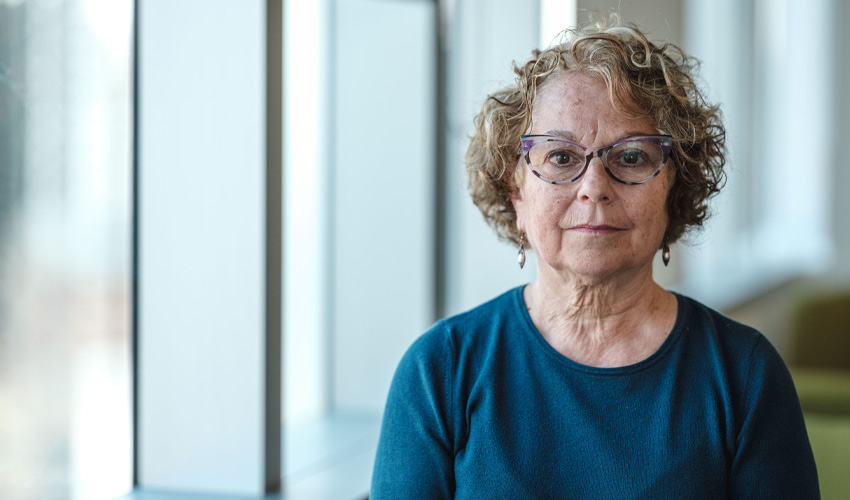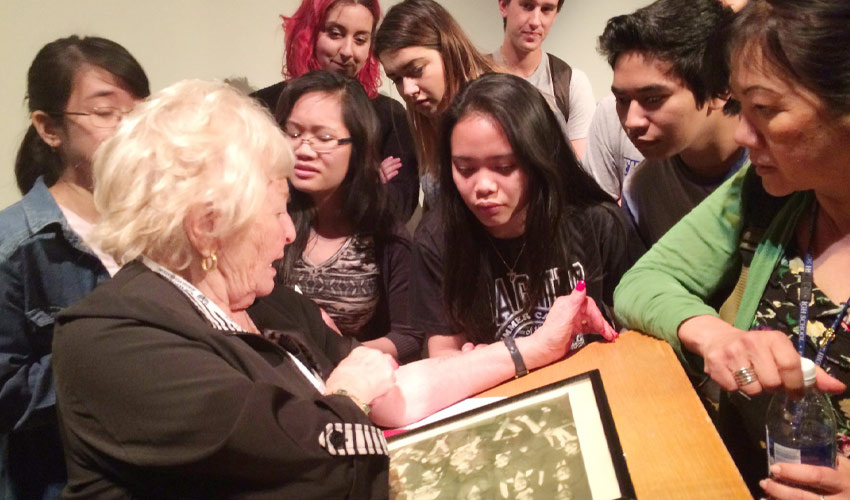With antisemitism increasing, Holocaust Education Symposium needed more than ever
Program at MRU returns to in-person format May 2 and 3
— Mount Royal University | Posted: April 24, 2023

Pearl Herscovitch is a subject librarian for education, child studies and the Holocaust Collection at Mount Royal and a Symposium co-organizer.
With antisemitism on the rise, and memories of the Second World War fading, the need for Holocaust education grows greater.
For nearly 40 years, Mount Royal University has been part of the Calgary Jewish Federation’s annual Holocaust Education Symposium. Through the Symposium, tens of thousands of high-school students have heard directly from Holocaust survivors who recount their horrifying and complicated experiences while also bringing messages of hope and resilience.
Returning to an in-person format this year on May 2 and 3, the event will see hundreds of students in Grades 11 and 12 attend one of a number of presentations in multiple theatres on the MRU campus at no cost each day.
"Mount Royal University is so proud of our ongoing association with the Calgary Jewish Federation in bringing the Symposium to Calgary students,” said Tim Rahilly, PhD, president and vice-chancellor of MRU. “There is an immediate need for education about the Holocaust and opportunities for survivors and historians to share their experiences and stories with students.”
This year, those survivors include Fania (Fanny) Wedro, Sahbra Markus and Ann Dancynger, who will speak to around 550 students on each day. The Symposium will be split between the Jenkins Theater, B101 and Ross Glen Hall. Presentations also include a video titled The Pathway to Nazi Genocide produced by United States Holocaust Memorial Museum, and an addresses from historians and associate professors Scott Murray, PhD, and Glen Ryland, PhD, from MRU, and Maureen Hiebert, PhD, from UCalgary.
In the face of the pandemic, the Symposium was adapted to a virtual format that allowed more than 4,000 students and educators to participate in May of 2021. Due to high demand, the Symposium’s online version has continued as well.
The Symposium was established when, after suffering the atrocities of the Holocaust, Calgary survivors were being subject to alarmingly increasing antisemitism and Holocaust denialism across their communities, explains Marnie Bondar and Dahlia Libin, co-chairs of the Calgary Jewish Federation’s Holocaust and Human Rights Education Department.
“Despite how truly difficult it was for these survivors to recount the tragic and traumatic memories of what they had endured during the Holocaust, they amazingly found the strength from within to not stand idly by, but to speak out and to start sharing their Holocaust experiences,” Libin says.
Bondar adds, “With the stark and frightening rise of antisemitism that we are seeing today in schools, online, in the media and throughout our communities, along with the reality that we are soon to be in a world without Holocaust survivors, the Symposium is more important now than ever.”
Students respond to survivors’ stories
Holocaust education emphasizes that by learning not only about the Holocaust, but understanding the reasons behind the largest mass genocide in world history, Canadians can all play a role in ensuring such a horrific event never happens again.
Students experience the Symposium in different ways, but while there may be some shuffling of feet and checking of phones early on, when the survivors speak “you can hear a pin drop,” say organizers.
“People often worry the students are going to say the wrong thing, or ask bad questions. I don’t believe in bad questions,” says Pearl Herscovitch, subject librarian for education, child studies and the Holocaust Collection at MRU and a Symposium co-organizer. “The students are amazing. For the most part they are really earnest and they truly want to know more. They’ll ask some very insightful questions, or just things like, ‘When you arrived in Canada what was life life for you?’ Or, ‘Did you maintain your faith?,’ which you don’t expect from a 17-year-old. I’m always impressed.”
“Our survivors want people to know their stories,” adds co-organizer Carrie Scherzer, PhD, associate professor of psychology at MRU. “They want these students to stand if someone is engaging in hate speech or Holocaust denial and be able to say, ‘No, no, you don’t get to say that because I met someone who was there.’ ”
After the war, many Holocaust survivors came to Canada as refugees with next to nothing. That resonates further with students who come from war-torn regions of the world such as Syria and Ukraine. While their experiences are different, they too may have lost family and suffered.
“It gives hope to a lot of our students now who are also first-generation Canadians,” Scherzer says. “They’re recent immigrants, so there’s a lot of hope in the message, not just about the Holocaust, but about surviving in Canada.”

Bronia Cyngiser displays the tatto number she was given at Auschwitz.
The Symposium also remains timely because despite ongoing efforts to teach children about the state-sponsored evil, industrialized killings and mass murders that were the essence of the Holocaust, antisemitism is on the rise in North America and it continues to be the number-one reported hate crime in Canada. Vandalism, violence and verbal attacks are all forms of antisemitism that remain prevalent today.
Statistics Canada indicates that 52 per cent of all hate crimes against a religious group are targeted against members of the Jewish community while they constitute just one per cent of the Canadian population.
MRU historian Murray, who has participated in the Symposium for 20 years, says the event gives a human face to events that are quickly passing from contemporary memory into the abstract realm of history.
“Platitudes like ‘never forget’ and ‘never again’ can only be realized if people are actually aware that the Holocaust was one of the greatest crimes ever perpetrated by human beings against one another — and we can't rely on popular culture to teach that hard truth.”
Murray says the Symposium also “helps students to see that minimizing or ignoring forms of hatred like antisemitism — or racism, misogyny, transphobia, homophobia or Islamophobia — invariably leads to the persecution of the people targeted by those hatreds.
“Hearing first-hand about the experiences of people who had the misfortune to live through the Holocaust teaches students that silence does contribute to oppression, and that they have a very real responsibility to speak up, always.”
Strong support from MRU
Both Herscovitch and Scherzer call the Symposium a “passion project,” as it was for Izak Paul, a faculty member in biology who originally spearheaded the Symposium from the Mount Royal end through working with the Calgary Jewish community. Mount Royal has been a steadfast supporter of the event and of Holocaust education in general.
“We’ve had incredible support from Mount Royal,” Scherzer says. “It’s been unwavering support no matter who is in administration, and support as well from faculty. In the past, we’ve also had several faculty members from the University of Calgary as well as a faculty member from Ambrose University come speak as a historian. Everybody gets behind this. Nobody has ever said ‘no.’ ”
Participating survivors, now in their 80s and 90s, are of course aging and eventually will be unable to speak to students, so the educators at the Calgary Jewish Federation are gradually introducing video of survivors combined with live appearances from their children and grandchildren. This not only allows for the survivors’ stories to continue, but introduces the elements of the intergenerational trauma experienced in families.
MRU’s world-class Archives and Special Collections and Library offer even more capacity for preserving and sharing these stories with young people, particularly through The Sid and Bronia Cyngiser Holocaust Education Collection. Although they can no longer speak at the events, the couple is well remembered. Bronia Cysgeiser, for example, was known for inviting students up for a hug after she spoke. A number of years ago Sid Cyngiser was scheduled to speak at the Jenkins Theatre. He’d arrived early to take in the whole program, as he always did, on a stifling day when the air conditioning wasn’t working. Scherzer recalls feeling terrible about the heat and making sure Cyngiser had plenty of water.
“I said, ‘Is there anything else I can do? I’m so sorry it’s so hot and uncomfortable.’ He looked at me with a twinkle in his eye and said, ‘I’ve been through worse!’ I love sharing that anecdote. Here he was in his 80s, having survived the Holocaust with this beautifully intact sense of humour and such an inspiring outlook on life.”
There are a limited number of community spaces available for this year’s Holocaust Education Symposium. If interested, please contact Carrie Scherzer at cscherzer@mtroyal.ca.

